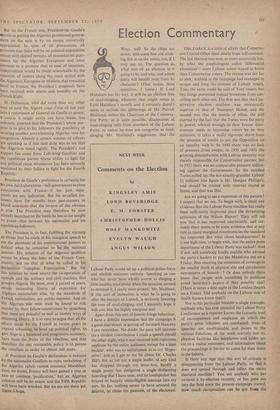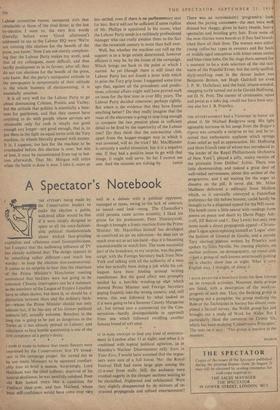Election Commentary
Labour Party would set up a political police force and abolish elections entirely. Speaking as one who has never been wholly averse to slinging a little healthy mud about when the occasion seemed to demand it, 1 really must protest; Mr. Maitland, if this sort of imbecility is what he is going to offer the electors of Lanark, is seriously lowering the tone of mud-slinging, and 1 sincerely hope it Will cost him his highly marginal seat.
Apart from this sort of lunatic-fringe behaviour, I have a definite impression that the campaign is a good deal slower at getting off the mark than any I can remember. No doubt the pace will increase (as a modest contribution I made a speech myself the other night, which was received with rapturous applause by the entire audience, except for a lone heckler, who was so unfortunate as to cry 'Hypo- crite!' just as I got to my bit about Dr. Charles Hill), but as yet not a single leaflet of any kind has dropped through my letter-box, hardly a single poster has disfigured a single disfiguring hoarding that I have seen, and no loudspeaker has brayed its happily unintelligible message into my ears. So far, nothing seems to have aroused the interest, let alone the passions, of the electorate. This, I take it, is a state of affairs that Conserva- tive Central Office must dearly hope will continue. The last election was won, or more accurately lost, by what the psephologists called 'differential abstention'—more Labour v,oters stayed at home than Conservative voters. The reason was not far to seek; nothing in the campaign had managed to arouse and keep the interest of Labour voters. True, the same could be said of Tory voters, but two things prevented mutual boredoms from can- celling each other out. The first was that the Con- servative election machine was enormously superior to that of Transport House, and the second was that the inertia of office, the Pull exerted by the fact that the Tories were the party in power, whrked strongly in their favour. Gov- ernment tends to hypnotise voters by its very existence; it takes a really vigorous shove from the pressure of events to put the Opposition on an equality with it. In 1945 there was no lack of pressure from events; in 1950 and 1951 the growing dissatisfaction with Labour austerity was mainly responsible for Conservative success; but in 1955 there was no comparable pressure militat- ing against the Government. So the satisfied Tories rolled up, the not-exactly-gruntled Labour If millions (the figure is Mr. Morgan Phillips's, and should be treated with reserve) stayed at home, and that was that.
Are we going to see a repetition of this pattern? 1 suspect that we are. To begin with, is there any evidence that the Labour Party machine has really been sufficiently improved since the devastating criticisms of the Wilson Report? They will tell you 'that it has improved enormously, and cer- tainly there seems to be some evidence that at any rate in many marginal constituencies the standard has improved. But what about headquarters? Is it not high time, to begin with, that the entire press department of the Labour Party was sacked? And if not, will somebody kindly explain who advised the party's leaders to put the Manifesto out on a Friday, thus ensuring the minimum of coverage in the smaller (both in physical size and circulation) newspapers of Saturd07? Or does nobody there know that people with something to publicise avoid Saturday's papers if they possibly can? (There is never a first night in the London theatre on a Friday. Did anybody on the Labour side of Smith Square know that?) Nor is this particular blunder a single example; anybody who has ever attended the Labour Party Conference as a reporter knows the fantastic level of incompetence and suspicion on which the party's press relations are conducted; texts of speeches are unobtainable and passes to the various functions of the week scarcely less so, physical facilities like telephones and tables are cut to a risible minimum, and information about the proceedings is harder to come by than water in the Sahara.
Is there any sign that this sort of attitude is disappearing from the Labour Party, or that it does not spread through and infect the entire electoral machine? You ask anybody who has covered a by-election recently, or has gone out into the field since the present campaign ,started, how much co-operation can be got from the Labour committee rooms, compared with that obtainable at those of the rival firms; at the last by-election I went to, the very first words (literally; before even 'Good afternoon') addressed to me at the Labour HQ were 'We're not running this election for the benefit of the press, you know.' Now I am not merely complain- ing that the Labour Party makes my work, and that of my colleagues, more difficult, and thus hardly predisposes us in its favour; after all, they do not run elections for the benefit of the press, you know. But the party's antiquated attitude to the newspapers is symptomatic of their attitude to the whole business of electioneering; it is essentially amateur.
It is all very well for the Labour Party to go about denouncing Colman, Prentis and Varley; but the attitude that politics is essentially a busi- ness for gentlemen, and that they cannot have anything to do with people whose services are obtainable only for cash is simply not good enough any longer—not good enough, that is, to put them in the fight on equal terms with the Tory machine, its wheels liberally greased with money. It is, I suppose, too late for the machine to be overhauled before this election is over; but win or lose, it must be reconstructed from top to bot- tom afterwards. That Mr. Morgan will retire when the battle is done is now. I take it. more or less settled, even if there is no parliamentary seat for him. But it will not be sufficient if some replica of Mr. Phillips is appointed in his room; what the Labour Party needs is a ruthlessly professional manager who can really awaken them to the fact that the twentieth century is more than half over.
Well, but whether the machine can roll up the support is to a large extent determined, however efficient it may be, by the issues of the campaign. Which brings me back to the point at which I started. As yet (though there is still time) the Labour Party has not found a lever with which to prise the Tory grip loose. I suggested some time ago that, against all the precedents and predic- tions, colonial affairs might well have proved such an issue for the first time in over fifty years. The Labour Party decided otherwise; perhaps rightly. But where is the evidence that they have found anything better? Do they really imagine that the mass of the electorate is going to stop long enough to compare the two pension plans in sufficient detail to be fired by the superiority of the Labour one? Do they think that the non-nuclear club, apart from the hugger-mugger way in which it was invented, will do the trick? Mr. MacBlunder is certainly a useful invention; but it is a negative one. If they had a positive issue to go with that image, it might well serve. So far I cannot sec one. And the minutes are ticking by. TAPER



































 Previous page
Previous page